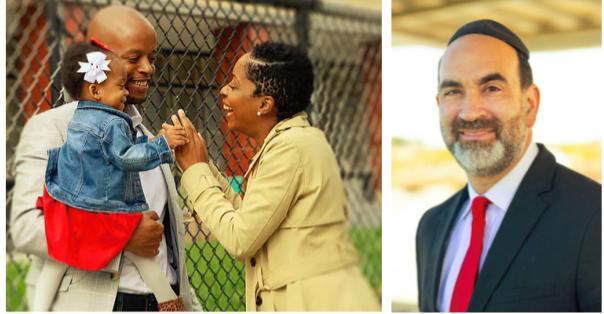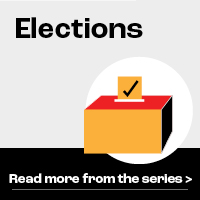The race between two frontrunners will come down to how 27 percent of voters ranked the candidates.

selvena.com & pesachosina.com
Selvena Brooks-Powers (with husband and daughter) and Pesach Osina were just over 200 votes apart after the first round of counting.New York City’s new system of ranked-choice voting is getting its first real test in the aftermath of a special election for a Queens Council district on Tuesday.
The nonpartisan election in the 31st Council district (covering Arverne, Brookville, Edgemere, Far Rockaway, Laurelton, Rosedale, Springfield Gardens) became necessary when Donovan Richards resigned after winning a special election in November to become Queens borough president.
In unofficial results released by the city’s Board of Elections, veteran government and union operative Selvena Brooks-Powers led with 38 percent. Just over 200 votes behind, with 35 percent, was Pesach Osina.
Manny Silva (10 percent), Latoya Benjamin (5 percent), Sherwyn James (4.4 percent), Shawn Rux (2.7 percent), Nancy Martinez (2 percent), Latanya Collins (1.4 percent) and Nicole Lee (0.9 percent) trailed.
Those, however, are just the first round results. In ranked-choice voting, voters rank up to five candidates by preference. If no candidate wins 50 percent of the votes in the first round, the candidate receiving the lowest total is eliminated from the race, and voters who picked him or her have their next viable choice counted. That continues until there are just two candidates, and one is the winner.
The early returns in the 31st District indicate that Lee, Collins, Martinez, Rux, James, Benjamin and Silva will be eliminated in stages and their votes reassigned, because none of those candidates can possibly catch the two frontrunners. With 26.6 percent of the final vote effectively still outstanding, either Brooks-Powers or Osina could prevail.
“I am truly humbled by the support we have received, and we’re confident that once every vote has been counted, I will be the next Councilwoman,” Brooks-Powers said in a statement. “While there was substantial confusion about Ranked Choice Voting, these early results are promising and I look forward to all of the votes being counted. Our community deserves to have a fighter in City Hall to ensure we can recover from this pandemic and finally get our fair share. Today we have completed the campaign for the special election, and now we must move forward, complete the counting and make sure every voice is heard.”
Ranked-choice voting was approved by voters as part of a series of charter revisions in 2019. It is intended to correct two flaws that existed in the city’s election system: candidates with relatively small shares of the vote prevailing in crowded Council primaries, and the expense and low turnout associated with runoff elections for citywide offices.
Ranked-choice voting kicked in on Jan. 1, and was in place for a Feb. 2 special election in a different Queens district. Because the winner of that race prevailed easily in the first round, the mechanism was never activated.
Once Tuesday’s results are resolved, the winner will represent District 31 until Dec. 31. As is the case for the city’s other 50 Council districts, the regular 2021 elections for this seat are still to come, in the form of a likely June primary and November general election. The winner in November will serve the district from Jan. 1, 2022 through 2023. (Normally, Council terms are four years, but every 20 years there are two, two-year terms to permit redistricting after the decennial Census.)
If the winner of Tuesday’s special election is reelected in November, they will be permitted to serve through 2029, facing elections in 2023 and 2025. If that occurs, they will be among the most senior members of the body by the time they leave the Council.
Tuesday’s contest represents the third in a series of special elections reshaping the city’s legislature before the regular 2021 elections—which will replace at least 29 term-limited Council members—do.
Kevin Riley won a December race in District 12 in the Bronx (Wakefield, Olinville, Edenwald, Eastchester, Williamsbridge, Baychester, Co-op City) to replace Andy King, who’d been expelled. Former Council member Jim Gennaro prevailed in that Feb. 2 race in the 24th district, where Rory Lancman had resigned for a job with the Cuomo administration.
On March 23, there will be specials in two Bronx districts: in the 11th (Bedford Park, Kingsbridge, Riverdale, Norwood, Van Cortlandt Village, Wakefield, Woodlawn) to replace Andrew Cohen, who resigned to become a judge, and in the 15th (Bedford Park, Fordham, Mount Hope, Bathgate, Belmont, East Tremont, West Farms, Van Nest, Allerton, Olinville), where Ritchie Torres left after being elected to Congress.
While special elections address one problem created by Council vacancies—the absence of representation for tens of thousands of voters in each vacant district—they often exacerbate a different problem: the abysmal turnout in municipal races. Although mail-in ballots still need to be counted, the 6,863 total votes tallied on Tuesday represents turnout of about 7.2 percent. By comparison, there was 24 percent turnout for the last general election in that district.









